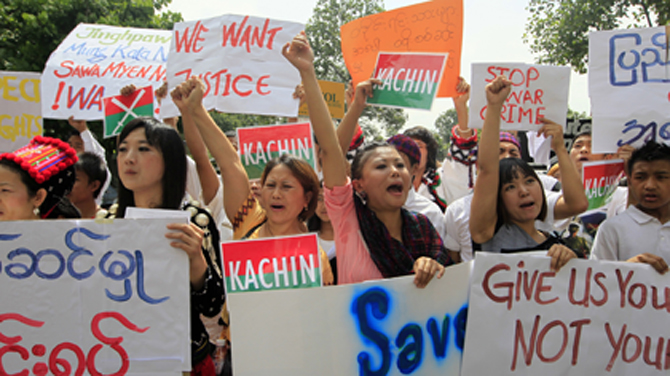Burma Peace May Rest on Indian and Chinese Greed

This adds weight to a 2007 agreement for a network of three lines between India and Burma that traverse Bangladesh—involving India building and restoring rail links in Burma through projects estimated at more than $730 million.
A sustained concern remains regarding insurgencies in India's resistive northeast around Nagaland, which has prompted the Indian government to request military assistance from the Burmese armed forces in exchange for armaments in recent years.
But the new Trans-Asia Railway, which aims to connect the continent from Istanbul to Hanoi, has already begun construction in Manipur—despite the United Naga Council organizing repeated blockades—and work has been hastened by political developments.
The Asean–India Free Trade Area agreement between the 10 bloc members and New Delhi was first signed in October 2008, and came into effect at the start of 2010. Opening these borders could bring about the renaissance of a modern Silk Road, with Burma's chair of Asean in 2014 cementing its place at the center of commerce with India and beyond.
“I think it’s very possible that connections between Burma and northeast India will greatly intensify in the years and decades to come, not just in terms of trade, but also people and ideas,” eminent historian Thant Myint-U told The New York Times.
“To some extent, this is a return to the past, and the reawakening of centuries-old ties, especially between places like Manipur, Assam, and Burma. It once took weeks if not months to travel from Assam to Burma. Today it takes days. Soon it may take hours.”
However, there are other crucial factors to consider. “A sustainable peace, including in the Kachin State, is essential for all this to happen,” he added.
And so the calming of the Kachin conflict in northernmost Burma takes on renewed significance for the region. Not only are major Sino-Burmese construction projects—such as the Shwe Gas pipeline, Myitsone hydropower dam and Trans-Asia Railway—dependent on a sustainable peace, but the lifting of punitive US and European Union sanctions could also be jeopardized.
A Human Rights Watch report released on Tuesday accused the Burmese government of a litany of abuses in the conflict-ridden area, and opening up trade in the region may well rest on achieving a lasting peace.
China's interests in Burma are indisputable with loans and credit to the regime, as well as economic aid and investments for the construction of dams, bridges, roads and ports as well as exploiting natural gas reserves in the Arakan region.
Beijing often quotes the issue of border security as its single greatest concern when dealing with the Kachin issue, but economic factors may soon have a greater bearing with the weakening of traditional markets in Europe and the US.
The Chinese government has repeatedly hosted peace talks between a Burmese government peace delegation and the Kachin Independence Organization (KIO)—most recently in the Yunnan bordertown of Ruili on March 8 and 9—but little progress has been made as fighting continues to date.
Observers fear that the continued Kachin opposition to Chinese-backed projects such as dams on the Irrawaddy River could provoke a fiercer reaction from Beijing, which has lots to lose from the continued conflict and is wary of a flood of refugees crossing into its southwest.
It appears likely that China will encourage Naypyidaw to find a peaceful solution to the fighting. On March 1, Thein Sein spelled out his three-stage “peace roadmap” to the Union Parliament. This included ceasefire truces, economic development with assimilation into the state apparatus and lastly amendments to the 2008 Constitution to address ethnic concerns.
However, decades of mistrust means that ethnic armed groups—particularly the KIO—will be unwilling to surrender their arms for the “promise” of constitutional reform. It is possible that Beijing's lust for prosperity could push their mediating position further to give both Naypyidaw and rebel groups a nudge towards compromise.
Only this week US President Barack Obama signed a bill that restores his ability to impose tariffs on imports from nations such as China when their goods are believed to have been subsidized or dumped on the US market. And China has just posted a massive trade deficit in the first two months of 2012.
It is likely that both India and China could well be pinning greater hopes on Burma as a source of economic salvation.
« previous 1 | 2 |
|
||
|
||
|
||
|
||
|
||
|
||
|
||
|
||
|
||
|
||
|
||
|
||
- 'My Wife Died From Police Abuse,' Says Husband
- US Says Observer Conditions Don't Meet Int'l Standards
- 159 Observers to Monitor Burma Election
- Govt to Address Breaches of SSA-South Ceasefire: Aung Min
- Burma Investors Pin Hopes on Seminal Sunday
- Malaysia PM Leads 50-Strong Delegation to Burma
- US Congress to Assess Burma's Political Prisoner Issue
- Rangoon Woman in Police Station Death Plunge
- Burmese Legal System Remains Tool of Govt: AHRC
- Burmese Army Chief Defends Political Role
